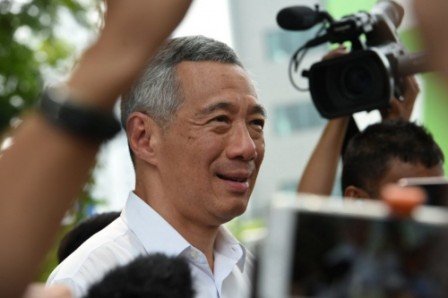Opposition seeks end to one-party dominance as Singapore votes
Singapore
Singaporeans voted Friday in the most hotly contested election in the country's history after massive turnouts at opposition rallies boosted chances that a two-party system will emerge from half a century of domination by the ruling party.
The People's Action Party (PAP), co-founded by the late independence leader Lee Kuan Yew and now led by his son, Prime Minister Lee Hsien Loong, is widely expected to retain a clear majority in the 89-seat parliament.
But analysts say an emboldened opposition -- buoyed by turnouts of up to 30,000 at its campaign rallies in contrast to weak attendance at PAP gatherings -- could make further inroads after gains in the 2011 polls.
The PAP, which steered the former British colony to prosperity while using an iron fist to suppress dissent, was stunned in 2011 when its share of votes plunged to 60 percent, its lowest ever.
Government control of mainstream media was undermined in the recent campaign by independent portals and the opposition's aggressive use of social media platforms like Facebook and YouTube.
Polls closed at 1200GMT after staying open for 12 hours and voting was orderly.
- High turnout expected -
The elections department said 2.09 million out of 2.46 million eligible voters had cast ballots by 0900 GMT. Results are expected by midnight (1600 GMT).
The turnout was 93 percent in 2011. Voting is mandatory in Singapore with few exemptions.
"Whatever it is, I just hope it's a government, it's a party, that rules responsibly," schoolteacher Gayathri Chandra, 24, a first-time voter, told AFP after casting her vote.
She said she was hoping for "a change of government" in "certain areas".
Most MPs are elected as part of geographic clusters. They are in charge of municipal services in addition to crafting legislation.
Despite its drop in popularity in 2011, the PAP won 80 seats thanks to the block-voting system, while the Workers' Party (WP) captured seven seats, the opposition's highest ever.
Prime Minister Lee had staked the PAP's fate on its performance record.
"In this election, we are showing a report card. We are proud of it, I hope you are proud of it too. We are asking you for a mandate. Work with us, help us to make things better for Singapore," he said in his final election rally speech on Wednesday.
But the WP urged voters to support the building of a robust legislative opposition to rein in the PAP and force it to reform its policies on immigration, health care and social safety nets for the poor and elderly.
"We cannot allow Singapore to fall into a situation where our survival depends only on the PAP, or just on any one party," WP chief Low Thia Khiang, a charismatic former schoolteacher, said in a campaign speech.
- 'Very tight races' -
The elections are being held amid an economic slowdown in the trade-reliant city state, hurt by weak demand for its exports and domestic pressure from a manpower shortage following a slowdown in the intake of foreign workers in reaction to a public backlash.
A longtime ban on the publication of pre-election voter surveys makes it difficult to predict the poll outcome.
Local research firm Blackbox said it expected "some very tight races" in the country's eastern region, the opposition bastion where a five-seat district was snatched by the WP in 2011.
Under a unique system that the PAP says is designed to ensure representation of minorities in a city state dominated by ethnic Chinese, 85 percent of parliamentary wards are grouped into blocks of four, five or six seats. Members of the Malay, Indian or other minorities must be represented.
The opposition says the system favours the ruling party and wants to abolish it.
Eyes will also be on the tiny Singapore Democratic Party (SDP), led by Chee Soon Juan, a dissident who has drawn thousands to his rallies after being in the political wilderness for years.
As in 2011, the opposition hammered the PAP over immigration. The population surged from 4.17 million in 2004 to 5.47 million in 2014.
The government subsequently slowed the intake and spent billions of dollars on public housing and transport infrastructure after Singaporeans complained of overcrowding and economic competition from foreigners.
Related Posts

